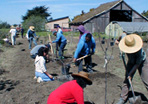San Juan Bautista, Calif.

This week Miguel Martinez made his first trip to Washington, DC. He did not go to see the sights or tour the White House; Miguel, along with Bret Malone, the Executive Director of the Agriculture and Land Based Training Program (ALBA) in Salinas, Calif., was invited to a United States Department of Agriculture farmer fly-in to talk policy. Specifically, this long series of meetings was designed to determine the needs of new farmers and how the next Farm Bill should help. Between meetings with the Senate and House Agriculture committees, Miguel took a couple minutes to tell us his story, from Santa Rosa in the state of Michoacan, Mexico to Washington, DC, and how Farm Aid funded group ALBA helped along the way.
It isn’t easy to start a farm business, even if you grew up on a farm, went to school for agricultural sciences and have a green thumb. Now imagine that you are new to the country, aren’t sure how to write a business plan, work a 60-hour week working on a corporate vegetable farm but still have a dream of running your own farm. This was the situation Miguel was in, in 1998, when he first heard of ABLA’s Programa Educativo para Pequenos Agricultores (PEPA), a six-month course to help aspiring build their own organic farms. Most PEPA participants are from Mexico and Latin America but as Miguel says, “farming is farming, heritage aside.”
The course covers business planning, marketing, bookkeeping, assessing and leasing land and practical how-to’s of organic farming. Students attend 23 classes on Wednesday evenings from November through April, as well as a variety of different field days throughout the season. On their farm in Mexico, Miguel and his family grew corn, squash, beans and other indigenous crops without pesticides of any kind. “We just couldn’t afford to farm that way,” he explains. This experience, however, was helpful in learning the techniques needed to run a certified organic farm. “Today, we try to make it work the same as we did back then.”
When students graduate from PEPA, they are eligible to rent land and equipment on ALBA’s 112 acre farm in Salinas. Currently, there are 25 farmers on the farm varying in experience from one to six years. One of the benefits of having so many farmers on one farm is the amazing range of crops. At any give time there are more than 45 different fruits and veggies on the land. Once the seeds are in the ground, ALBA works with the farmers to ensure that they have a market through CSA’s, farm to cafeteria programs at Stanford and University of California’s Santa Cruz campus as well as their very own brand, ALBA Organics.
Miguel continued to work at his farm job for another two years after graduating from PEPA. Once he and his family were ready, they purchased 10 acres and leased another 23 to create Santa Rosa Organic Farm in San Juan Bautista, Calif. While Miguel is in Washington, his father and brothers are looking out for their crops of strawberries, tomatoes, spinach and broccoli. In total, 12 members of the Martinez family live and work on the farm. Together with 15 other farm employees, they are able to market their products to Trader Joes, the ALBA Organics label and their own Santa Augusta label.
“It was a big change,” Miguel says, “from working for somebody all the time to working for ourselves. Now, that I can make my own decisions, I think I [enjoy] work a lot more!” Thanks to the hands on business and technical training that ALBA was able to provide Miguel’s transition was quite smooth.
However, the work of ALBA teachers and organizers does not end at the farm gates. A significant element of ALBA’s work with new and minority farmers is to help increase the farmers’ understanding of farm policy and their involvement with farm advocacy. Essentially, ALBA participants are also learning about community leadership at the same time that they are learning about the nuts and bolts of running an organic farm. This enables them to participate in discussions, meetings and hearings about family farm policy to ensure that their voice is heard – something Miguel Martinez is proud to do this week in Washington, DC. “This is a time to talk about the support that farmers need,” he says simply.
Date: 7/15/2006


